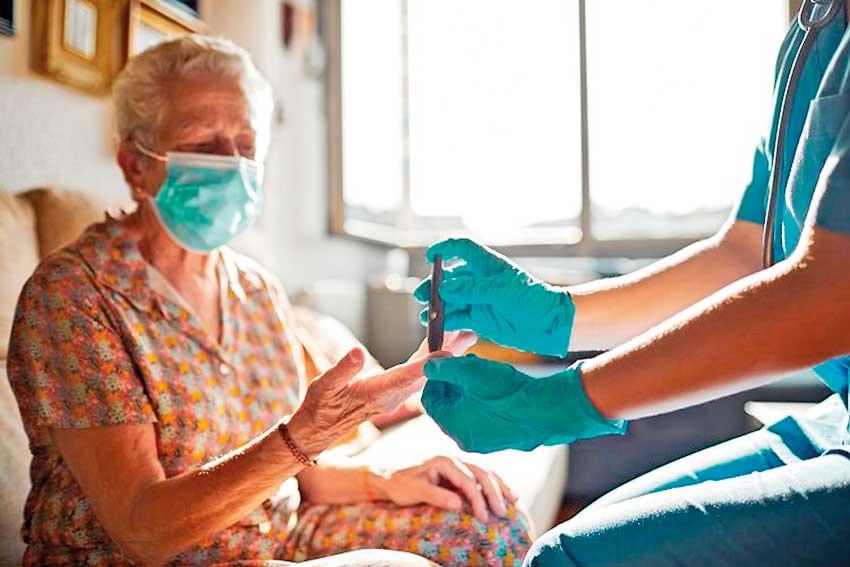Reply To:
Name - Reply Comment

 Recent studies published in Springer Link journal and medical journal Lancet in March 2022 focussed on people who have had COVID-19 infection in Germany and the USA, shows that there is a probable risk of type 2 diabetes in such people. The study in Springer Link journal, which was conducted in Germany shows that people who have had mild COVID-19 infection are 28% more likely to be diagnosed with type 2 diabetes than people who have never been infected with COVID-19. The study done in the USA, which was published in Lancet showed that there was a 38% increased risk of diabetes in those who have had COVID-19 and had low to no risk factors for diabetes. Speaking to Daily Mirror, Dr Niranjala Meegoda Widanege, Consultant Endocrinologist and Secretary of the Sri Lanka College of Endocrinologists shared that a possible reason could be due to the SARS-CoV-2 virus having the special ability to attack the pancreatic islet cells. These cells are responsible in producing insulin in response to glucose, controlling the blood sugar levels. “It is found that after the viral infection in some, the pancreatic islet cells are not able to produce sufficient insulin for the glucose load. That is why some people have a higher incidence of diabetes after the infection,” she revealed.
Recent studies published in Springer Link journal and medical journal Lancet in March 2022 focussed on people who have had COVID-19 infection in Germany and the USA, shows that there is a probable risk of type 2 diabetes in such people. The study in Springer Link journal, which was conducted in Germany shows that people who have had mild COVID-19 infection are 28% more likely to be diagnosed with type 2 diabetes than people who have never been infected with COVID-19. The study done in the USA, which was published in Lancet showed that there was a 38% increased risk of diabetes in those who have had COVID-19 and had low to no risk factors for diabetes. Speaking to Daily Mirror, Dr Niranjala Meegoda Widanege, Consultant Endocrinologist and Secretary of the Sri Lanka College of Endocrinologists shared that a possible reason could be due to the SARS-CoV-2 virus having the special ability to attack the pancreatic islet cells. These cells are responsible in producing insulin in response to glucose, controlling the blood sugar levels. “It is found that after the viral infection in some, the pancreatic islet cells are not able to produce sufficient insulin for the glucose load. That is why some people have a higher incidence of diabetes after the infection,” she revealed.
Risk groups
The following groups were more prone to developing diabetes:
“Even though these studies were done using a large group of people, further studies have to be done to confirm this. If it is confirmed, then we can advise those in the risk groups and also people who have been infected with COVID-19 to monitor their blood sugar levels and look out for signs and symptoms of diabetes,” shared Dr Meegoda Widanege.
Blood sugar can
rise during
stressful situations
She remarked that one of the possible factors could be that people who have previously had undiagnosed asymptomatic diabetes or mild diabetes could be diagnosed with diabetes after the infection. “Blood sugar can rise during stressful situations like pregnancy and infections. Sometimes people are diagnosed with diabetes after being admitted for a stroke or cardiac issues, this could sometimes be due to a previously undiagnosed condition of mild diabetes. But when they undergo a stressful situation, the blood sugar rises and the undiagnosed diabetes condition gets exacerbated and is diagnosed,” she explained. She also added that in the studies, the control group were people who have not been diagnosed with COVID-19 but had been diagnosed with other upper respiratory tract infections. “Taking the two groups into consideration, it was seen that the group with those who have had COVID-19 infection had an increased risk of diabetes.”
Dr Meegoda Widanege also noted that pre-diabetes and asymptomatic diabetes isn’t being diagnosed early as people tend to ignore signs and symptoms like increased fatigue and increased thirst, chalking them up to certain lifestyle changes.
Sooner, the better
She also shared that if people constantly monitored their blood sugar levels and took note of the signs and symptoms, then it would be possible to get an early diagnosis of diabetes. “It is important to diagnose diabetes early and ensure people get access to treatment early. If diagnosed too late, diabetes can give rise to various systemic complications,” she said.
As Sri Lankans, we are more prone to diabetes
Dr Meegoda Widanege noted that in developing countries, especially countries in the African and Asian region, people were more likely to get diagnosed with diabetes. “In Sri Lanka’s urban areas, more than 25% of people are diabetic. More than 10% people are diabetic across the island.” Shedding light on the possible reasons, she noted that sedentary and stressful lifestyle was a major contributing factor especially in urban areas. She also stated that genetics, dietary habits which included increased fast food and refined sugars in the diet and increased rates of obesity among the population were contributory factors for increased risk of diabetes in Sri Lankans.
“Currently no study has been/ is being conducted regarding the relationship of COVID-19 and diabetes in Sri Lanka. But I believe if we do conduct such a study, we might find similar results to the Germany and US studies. However, further studies must be done to conclude that COVID-19 infection is truly causing an increase in diabetes,” she informed.